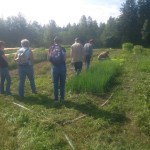We’ve all heard about climate change, right? We may not always be able to discern the changes we’re experiencing because of it, but our planet needs help.

Last week, the UN’s intergovernmental panel on climate change released a report detailing an urgent need for change – globally. One of its key messages is that we’re already seeing the consequences of 1C global warming with more extreme weather, rising sea levels, and drought – among other things. It outlines a need for rapid, and far-reaching changes in all aspects of society to slow the rate at which our planet is warming.
Though we don’t have a silver bullet, many solutions exist. Shifting the effects of climate change can even start with what we put in our mouths. Yes, you read correctly; bite-sized actions can pave the way!
Most of us know that the food we eat doesn’t magically appear on grocery store shelves. What we may not know are the processes that get food from its source to the shelf. Growing, catching, and producing food takes up a bundle of resources. If we reflect on the areas within the food system, we’ll see the many spaces where energy is required.

When we began industrializing our food system the hope was that it would boost efficiency, and create streamlined and centralized processing. Yield became one of the sole measurements of success. What emerged was a system in which mass agricultural production and factory farming were king, and smaller farms struggled to compete. The runoff from these changes has created dire consequences for our planet, and the people occupying it.
In the documentary Sustainable, John Ikerd – Professor Emeritus at the University of Missouri, explains that in the beginning, the industrial agriculture model made a lot of sense. The problem was that it simply didn’t work. Today, soil health has dwindled, and foods are no longer as healthy or wholesome as they once were. The increase in diet-related health issues can be traced back to when we began industrializing agriculture and food production. There is a mental health crisis within our small farming populations with people losing their livelihoods, and rates of food insecurity and hunger continue to rise.
Though the health implications are massive, some of us might be surprised to know that food is also a heavy hitter when it comes to climate change. In Canada, our 2015 agricultural greenhouse gas emissions account for 10% of national emissions. Food waste accounted for 3% (read more here). This, however, doesn’t include the other steps within the food system. Distribution, processing, infrastructure, packaging, etc. are estimated to make up another 15%. Almost 30% of our national greenhouse gas emissions! And, if we consider that food travels an average of 8000kms to our plates only to have about a third of it wasted, it seems we need to wake up and smell the landfill.
The Food and Agriculture Organization of the United Nations says that if food waste were a county, it would be ranked 3rd as the largest greenhouse gas emitter, second to China and the United States. In Canada, the true cost of food waste in 2014 was estimated at $107 billion. Perhaps even more frightening, is the fact that landfilled organic matter creates methane gas that is 25 times MORE damaging to the environment than carbon dioxide!
Ok. A moment to digest and take a breath. This grim outlook doesn’t need to last – there is hope!
At our local levels, there is so much we can do to start food action adventures at home, at work, and in our communities. We can support mother nature to keep us as respectful occupants of this land. We can start small, and make change one, bite at a time:
- Individuals can step back and look at where food is coming from. Shifting just 5% of our food budgets to a local source can make a huge impact; motivation to check out a local farmer’s market! Shifting to a more plant-based diet is good for our health and the planet – why not try out a meatless Monday? Make sure your freezer has lots of space to save your food from the garbage bin!
- Communities & Friends can share the cost of a community supported agriculture (CSA) box, start a local bulk buy club, and swap extra garden veggies (have you tried Olio, the food sharing app?). Share meals to reduce food waste and increase social connections.
- Organizations can host educational lunch and learns, commit to buying local foods for events and meetings, and support employee wellness by promoting time to eat away from desks, and providing wellness benefits that allow staff to buy a local CSA.
- Municipalities can be champions of the food system while saving money, increasing economic development, and supporting residents. Creating local procurement policies can boost local economic growth (check out the Kent Regional Service Commissions policy here!). Waste reduction campaigns, community composters and subsidized composters for residents can divert food away from the landfill. Support and staff time for community gardens can foster food knowledge and personal connections within neighborhoods. Finally, the adoption of Food Pledges and Food Charters can help build broader food strategies and provide levers for transformation in our communities. Ask your councilor what the municipality’s food policies are!
October 19th is Food Waste Friday! Share your actions on social media, and remember that one bite at a time is the best way to start. Let’s embrace change and create a livable future for ourselves and our future generations.
Jill Van Horne is the Network Development Coordinator with Our Food Southeast New Brunswick (SENB). Learn more about Our Food SENB: OurFoodSENB.ca
Follow us on Facebook, Twitter, & Instagram: @OurFoodSENB
Check out the Our Food Project NS: https://ecologyaction.ca/ourfood
Twitter: @OurFoodProject and @ecologyaction
Facebook: The Ecology Action Centre
Instagram: ecologyaction




